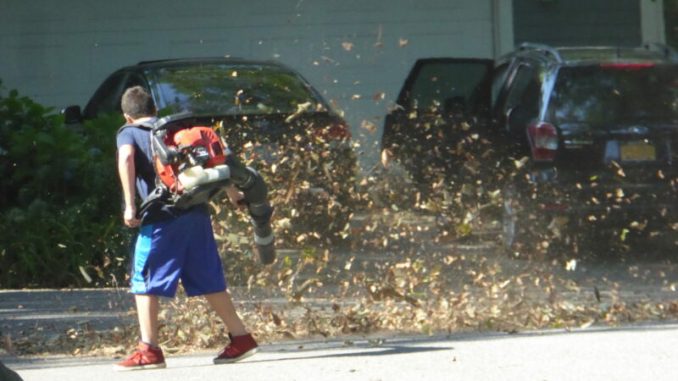
Resident urges better enforcement of North Hempstead gas-powered blower law
Al Franklin wondered if he is the proverbial lone voice in the wilderness.
Earlier this summer, he stepped out of his North New Hyde Park residence to record a violation of the Town of North Hempstead Code Chapter 38A, titled “Landscaping and Gardening.” A landscaping firm on his block was using gas-powered gas blowers, flouting the town code banning commercial operators from using such from June 15 to Sept. 15.
Following the town’s recommendations, he made note of the license plate and the business name/phone number, he related at an August Town of North Hempstead Town Board meeting. He claimed that, while taking photos, a worker operating a backpack blower deliberately sprayed him with the debris generated by the powerful blasts of air.
Franklin called the police, who showed up and informed him that this was a town code enforcement problem and no charges could be filed even though he felt that he had experienced a kind of physical assault. He has appeared several times before the town board to complain about violations of the town’s restrictions.
According to an account from the town’s 311 records, Franklin “had to call the police on the landscaping because he was very aggressive and the landscaper began to chase the constituent with the leaf blower.” Under the report’s “Activity Outcome” column it was written: “Violation found. Verbal warning.”
In an interview with Anton Media Group, Franklin asked a reporter if he knew others who had come forward with similar experiences. It seems no one has been as vocal as Franklin, but according to Supervisor Jen DeSena’s office, complaints about that noisy essential equipment for landscapers are common. The town’s 311 system was set up for residents to contact the town to request services and note code violations. The system keeps detailed track of the nature of the calls.
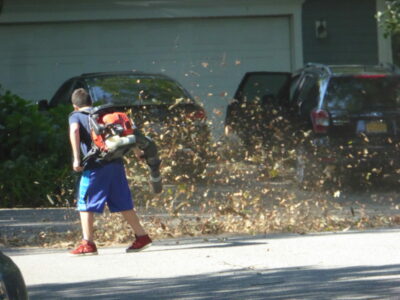
In an email, DeSena spokesman Brian Devine wrote, “As per 311, there have been 193 calls so far this year regarding gas powered leaf blowers, and leaf blowers being used outside of allowed hours. This is typically in line with the amount we saw the previous year (275 calls in 2021).”
The law governing leaf blowers was first discussed at a public hearing attended by dozens of stakeholders in September 2017 under then-Supervisor Judi Bosworth. Consequently, she set up an advisory committee which included landscapers to help shape the legislation and advise the town on landscaping matters. The ban took effect on Jan. 1, 2020, and mandated that electric or battery-powered blowers be used during that three-month stretch.
According to Franklin, the law has not had the desired effect—at least in his neighborhood.
“It’s not working well, [the blowers are] out there screaming every day,” Franklin told Anton Media Group. “I’m being abused by landscapers.”
In an exchange with his representative, Councilman Peter Zuckerman, Franklin argued that the ban period should be lengthened, and “we need to be more creative in how we ban gas leaf blowers during the summer.”
Aldo Calabrese of Port Washington, a member of the North Hempstead Business Association and the Nassau-Suffolk Landscaping Grounds Association, responded to Franklin at the August meeting. He had argued against the ban when it was first proposed, but claimed, “We the professionals in the industry are abiding by these rules. It’s been brought to my attention that Mr. Franklin seems to come to all these meetings and keeps harping on the same things. He will not stop. He was part of the solution with the [advisory] committee he was on. He’s no longer part of the solution. He is part of the problem.”
Calabrese suggested that the board reach out to him and he would be happy to speak with Franklin.
Reached by Anton Media Group, Calabrese said, “I got to know Mr. Franklin on the advisory committee. I like him. I think he’s a good guy, but a little overzealous, if you ask me.”
Asked, as the ban period was about to end, if he had seen improvements, Franklin replied, “Slightly. They don’t run [the blowers] at the full RPM and of course, that reduces the noise.”
He believes the landscapers working on either side of his house are aware of him and have modified their operations accordingly.
Franklin said he has called 311 and received a service response number and a promise of a callback, but was never contacted.
“I just get up there as a concerned resident,” Franklin said of his public comments. “If you don’t say anything, they’re not going to do anything. I don’t know how serious they are on enforcing [the ban]. Maybe they are short staffed. It’s an uphill battle. And I’m not going make an assumption, but I have a feeling that the landscapers know it.”
He was also critical of homeowners who did not force their landscapers to follow the law.
At the April 28 meeting Franklin detailed the known health dangers and adverse environmental impacts of gas blowers and stated, “I worked damn hard to get where I am with my house and I can’t even go out when the landscapers come to my neighborhood. I have to ask, what are you doing? What’s going to be done?”
DeSena answered, “I think it’s a valid question. It’s something that we can’t really resolve with our three minutes, but I do appreciate you sending me the information.”
Both Franklin and DeSena made note of bills that passed in the state legislature that would establish the electronic landscaping equipment rebate program to encourage the move away from gas-powered equipment.
The supervisor, according to her spokesperson, “recognizes our residents’ frustrations with the situation, and is currently reviewing how best to move forward to address the problem.”
A Supplier’s Perspective
Craig Murray of Carle Place and his son Darryl operate Liffco, a landscape contractor equipment sales and service company in New Hyde Park. Darryl served on the landscaping advisory committee formed by Bosworth and comprised of stakeholders to help shape the law, enacted by a vote of the board on Jan. 29, 2019 and which came into force on Jan. 1, 2020.
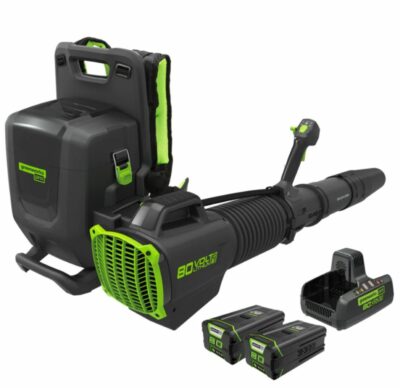
Murray said his company has sold hundreds of battery-powered commercial grade leaf blowers as landscapers sought to deal with the gas-powered ban—not just in North Hempstead, but in many villages as well. Liffco has even sold them to golf clubs, whose staff needed to clear leaves from greens early in the morning while alleviating noise complaints from neighbors.
“They’ve been very well accepted,” Murray said of the battery-powered leaf blowers.
He went on to say that commercial blowers have gone down in price as more are sold. An 82-volt backpack that provides the equivalent cubic foot per second power as a gas blower, along with two batteries and rapid charger, runs about $800. The manufacturer, Greenworks, claims that operating costs are lower than those of gas blowers over time.
Murray said he bought a small hand-held battery-powered one for himself and it does the job. The three-month ban period, he observed, coincides when few leaves fall and landscaping debris can be easily handled by non-gas blowers.
He sympathizes with contractors who need to keep the batteries charged or buy extra batteries and possibly a generator.
But as a homeowner, he’s also experienced the noise, saying that “Even I get upset,” when he’s sitting by his pool on a day off and backpack blowers are being used around him.
Darryl Murray’s Statement
This is the testimony of Darryl Murray when he appeared before the town board on Sept. 26, 2017 at a public hearing to discuss the proposed gas blower ban:
The power equipment industry as a whole has been moving towards greater engine efficiency, reduction of hydrocarbons and, also, reduction in noise. Blowers bought today have had a 90 percent reduction in their emissions since 2005. Ninety percent. That’s according to EPA data. And they’re also subject to the strictest federal emissions laws.
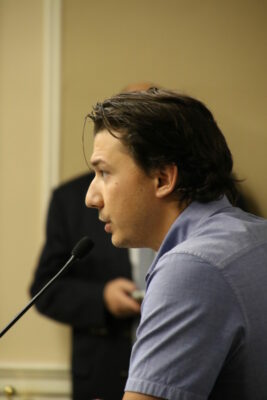
Gas backpack blowers, in particular, have an average life of two years, maybe three if you really take care of it. They also represent an 89 percent time differential over sweeping or cleaning by hand. Gas blowers have a greater efficiency of over 40 percent over an electric counterpart. And that means an electric unit would have to run for twice as long or require twice as many of them to do the same job.
Now as for noise. and the reason why I bought the decibel meter tonight is this. To put this into perspective, a vacuum cleaner in your house runs at 80 decibels. And you can go right on the ANSI website and get that information. Average decibel ratings on top selling blowers in the industry [is] 75 decibels. Battery-operated blowers [operate at] 67 decibels. That’s only ten percent. It’s a minute amount.
Corded and battery-operated units right now are just not up to industry standards. I sell the stuff. It’s just not up to the standards that [landscapers] need. These guys have to be able to go out and operate their businesses all day and work efficiently so they can make money. We’re talking about 23 minutes from start to depletion of a battery and then you’ve got to buy a generator and have that run for 60 minutes, 75 minutes sometimes to recharge the battery and then you’ve got to buy $250 batteries. And then you’ve got to buy the charger and all sorts of stuff. So we’re talking about a large financial investment.
Talk With A Landscaper
Aldo Calabrese of Port Washington is the CEO of Calabrese & Sons Landscaping Contractors Inc. He has led the family firm, founded in 1970, since 1985 and the majority of his accounts are large estates in the Flower Hill-Plandome area. He’s an officer for the North Hempstead Business Association and a member of the Government Affairs Committee for the Nassau-Suffolk Landscaping Grounds Association. He also belongs to the Landscape Contractors Association of Long Island.
“I’m very well engaged in the industry and I have a really good idea of what the impact [of the leaf blower law] is to both sides—the industry and the community,” he said.

Regarding the final town ordinance that he helped shape as part of the advisory committee he said, “All in all, I felt that it was fair,” though he admitted that there was not a full consensus on the part of his fellow landscapers on the committee and in the community. Many were not happy about the restrictions.
Calabrese called the backpack blower an essential tool to the industry. vital for the spring and fall cleanups.
“It is our finishing tool, probably the most important piece of equipment we have in our toolbox. It’s very efficient and it works extremely well,” he summed up.
Calabrese said he bought battery-powered blowers and other equipment soon after the law went into effect and had a year and a half of usage to draw on. He pointed out that the gas alternative has drawbacks. It is much more expensive, to start. As far as blowers, he used the most powerful, with two batteries, and if used continually they can run 20 to 40 minutes on full throttle.
“If you use it sparingly, you could probably get more time out of them, but if you use them full throttle for spring or fall cleanups, you have to have battery backups,” he said. “One battery can cost $400. That means you could spend up to $1,600 [for one blower] if you need more battery power. [By contrast] a powerful gas backpack blower will cost $500 to $600.”
Also, per Calabrese, if the leaves are wet, the blowing power might not be comparable to gas-powered ones. In addition, a demonstration showed that battery-powered blowers could have a higher decibel level than the quieter gas blowers.
On the advisory committee, he and several other landscapers served with environmentalists and other community members.
“I understand the environmentalists’ viewpoints, and one of the points I made was, ‘What happens when you have all these batteries that no longer can be charged or be reused?’ They all go into the landfill. You have thousands and thousands of batteries going into the landfill.”
He noted that battery-powered ride-on mowers with up to 60-inch mowing sizes are offered. Their power packs can weigh up to 600 pounds or more,
“What happens when those go bad?” he wondered, adding, “It’s great to have electric cars, electric backpack blowers. But you have to [ask], what does it do to the environment after?”
Calabrese works on large properties and consequently his equipment is put to a lot of use. Sometimes he has to bring a gas generator to charge his batteries.
Further, he said, “I have the charger [connected] with my truck, and if I draw from the truck battery [via an inverter] then I have to start the truck. I don’t have to tell you what happens if I have to run diesel trucks and have them idle—what that could do.”
He added, “There’s a lot to this issue. It’s not just noise and emissions. You have to realize how it impacts other things. That’s what some homeowners don’t see.”
Calabrese outlined what he called the problem in landscaping, observing, “A lot of individuals in this industry are not professionals, and the issue is they make us the professionals look bad because they’re not following the rules. meeting the time restrictions, the day restrictions and the noise restrictions.”
He added, “As far as the new law, yes we feel it’s fair and yes it has been enforced. And to my surprise, it has been enforced fairly, so I do commend the Town of North Hempstead Code Enforcement. We feel if you break the rules you should receive a violation.”
Long Island is home to thousands of landscapers and it’s an easy industry to gain entry. His landscaping associations do lots of training and disseminate information and host seminars. Calabrese himself holds multiple environmental certificates and is a certified organic landscaper.
“We have to be very careful with everything we do as professionals and abide by the rules and regulations and the laws,” he concluded. “But there are many who skirt that, and environmentalist and homeowners then blame the whole industry for the actions of a few, which is bad for our industry.”
The Enforcement
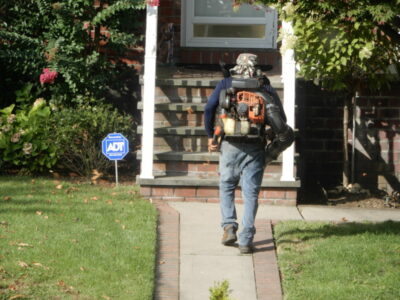
The following information came from a Freedom of Information Act request. We have picked examples from among the 193 complaints regarding the leaf blower law called in or emailed to the 311 system.
The Town of North Hempstead Department of Public Safety issued 20 appearance tickets for violators to appear at the County of Nassau Third District Court in Hempstead. All were violations of town law 38A-7, prohibiting gas leaf blowers from June 15 to September 15. A large number also had violations of 38A-3, not having town landscaping permits.
The first complaint specific to the law came in on June 15 at 2:09 p.m. from a Hillview Avenue location in Port Washington and in the ”Activity Outcome” column it states, “Further investigation needed.”
The next day, a complainant from Port Washington said when he “told the landscaper the rules he refused to comply. When he told them of the law they said they will continue to use the [blowers] until they are caught.” Outcome: “Violations found. Ongoing investigation.”
On June 20 in Port Washington, code enforcement issued a notice of violation. According to the constituent, “when he mention[ed the] statue to landscaper, they verbally abused him.
On July 5 a Port Washington North constituent reported a landscaper modified a gas-powered edger by adding a blower element, noting “it appears to be a method for going around the ban on backpack gas powered-blowers.” Outcome: “Further investigation needed.”
From North New Hyde Park on July 27 via an email with a photo attached: “This is an example of the many violators in the landscapers industry. They are ignoring the summer ban on gas leaf blowers. The neighborhood continues to scream with gas leaf blowers! The law is not being enforced. Why? [Landscapers] are ignoring the law and the town is not doing anything to enforce the law.” Outcome: “Photo not applicable.”
A Great Neck constituent on Aug. 13 complained, “The neighbors all around this home are fed up with the landscapers that are hired for this home—specifically for over 10-plus years. The landscapers/company does not abide by town rules and uses leaf blowers all year round. We have approached the worker to let him know about the rules, but he is young and nasty and curses at us. The homeowner he does service for has even bought (at his owner expense) an electric leaf blower, but they do not use it. We are fed up and this needs to be handled immediately.” Outcome: “Further investigation needed.”
From Carle Place on Aug. 23 came this complaint: “The company’s using very large gas blowers that men stand on. They’re also using the ones that carry on the back. There is dust everywhere. It feels like an invasion. Very loud. All the neighbors are affected by this. The dust goes everywhere.” Outcome: “Complaint was resolved.”

Be the first to comment